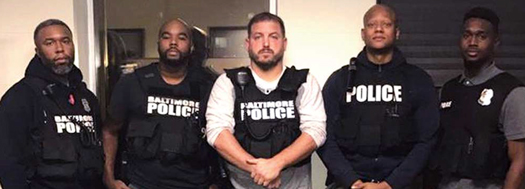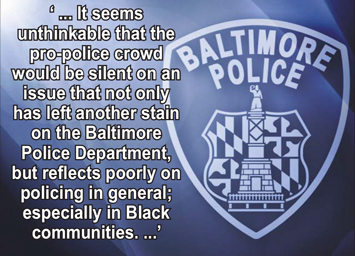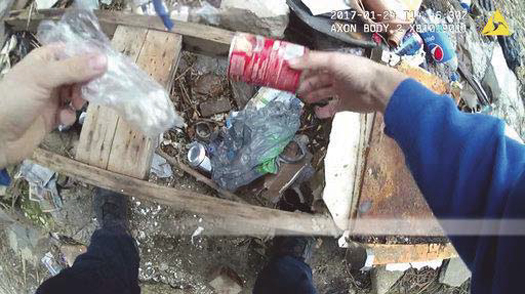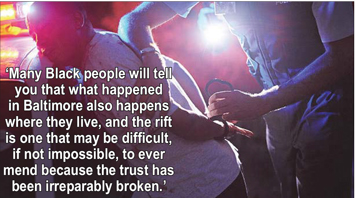Bad cops, Bad Cops - The troubling and largely untold tale of Baltimore Police Dept. corruption
By Bryan Crawford -Contributing Writer- | Last updated: Mar 22, 2018 - 12:55:09 PMWhat's your opinion on this article?

Members of the Baltimore police Gun Trace Task Force were indicted for corruption. Photo: AL/Wide World Photos
|
Given the extent of their crimes, the story of the Baltimore Police Department’s rogue Gun Trace Task Force Unit—where eight members of a nine-man unit were convicted on racketeering, conspiracy and robbery charges—has largely gone uncovered in the mainstream media.
In a case where six Baltimore police officers have pled guilty, two were recently convicted, a former Baltimore cop turned Philadelphia police officer awaits trial, and a bail bondsman, five known drug dealers and two civilians have yet to be sentenced. Adding to the drama, a police detective set to testify before a grand jury connected with the case was shot and killed.
Despite all of this corruption, the story has gained intermittent national attention and has generally managed to fly under the public radar.

|
In a country that has staunchly defended police officers who killed unarmed Black men and women, many times on camera, it seems unthinkable that the pro-police crowd would be silent on an issue that not only has left another stain on the Baltimore Police Department, but reflects poorly on policing in general; especially in Black communities where residents have screamed from the mountaintops about police corruption.
“If there is a police department in the country that should be disbanded, it’s Baltimore. It’s definitely Baltimore,” Corey Pegues, a retired NYPD commander and deputy inspector, now author and community activist, told The Final Call. “I think we can all agree that some people aren’t fit to be cops, just like some people aren’t fit to be doctors. And when you have so many cops doing these bad, egregious things, it leaves a sour taste in people’s mouths, especially in the Black community.”
Baltimore Police detectives Daniel Hersl and Marcus Taylor took their cases to trial where each was found guilty of racketeering, racketeering conspiracy and robbery. They now face as much as 60 years in prison.
Wayne Jenkins, the task force’s sergeant and leader, admitted to being involved in the commission of four robberies between 2011 and 2016. Mr. Jenkins pled guilty to four counts of deprivation of rights under color of law, two counts of robbery, and one count each of racketeering, destruction, alteration, or falsification of records in a federal investigation. He faces a maximum of 30 years in prison.
Detectives Maurice Ward, Evodio Hendrix, Momodu Gondo and Jemell Rayam, along with sergeant Thomas Allen, have all plead guilty to charges of racketeering. Mr. Gondo is facing 40 years in prison, while Hendrix, Rayam, Ward and Allen are all facing 20 years behind bars. Philadelphia police officer Eric Snell, who spent three years as a Baltimore police officer, is still being held in Baltimore. He faces up to 20 years in prison for conspiracy to distribute cocaine and heroin. David Kendall Rahim, cousin of Jemell Rayam, received a five year prison sentence for taking part in the officers’ recent robberies, as well as some that occurred a decade ago.
A Decade of Police Wrongdoing?
“This corruption went on unabated for nearly 10 years and was only brought to light as a result of a federal investigation,” the NAACP’s Legal Defense and Educational Fund President Sherrilyn Ifill said. “Neither City Hall, BPD’s Internal Affairs nor the state’s attorney’s office was able to uncover and hold accountable the officers at the heart of this criminal conspiracy.”
It is clear corruption within the Gun Trace Task Force Unit ran deep.

Police body cam shows evidence being planted by an officer. Photo: AL/Wide World Photos
|
Initially created to get guns and those considered to be violent criminals off the streets, the Gun Trace Task Force Unit became the violent criminals they were supposed to protect citizens from, engaging in the very behavior they swore to fight against. The officers were found to have sold guns and drugs on the streets, planted drugs and guns on suspects, committed cash robberies in excess of $300,000, used illegal GPS devices to track and target potential robbery victims, and billed the department for hundreds of hours of unworked overtime. In addition, more than 3,000 cases handled by the Gun Trace Task Force Unit have been called into question, meaning many people charged and convicted with the help of these officers could be released.
How could all of this have taken place for so long without anyone knowing?
Mr. Pegues says very easily, although it seems very unlikely those in positions of power were kept in the dark the entire time crimes were being committed.
“What happens in police departments is sometimes you have elite units that don’t fall out of a precinct. They have a little warehouse or something like that they work out of, and the rest of the department usually doesn’t know what’s going on until word on the street starts getting around,” Mr. Pegues explained.
“Given how long this was going on, word was obviously getting out on the streets that these were rogue cops. Then it got back to the police department. But now this creates another problem: Do you really want to shine that light on the police department or the police commissioner? Once it gets out, whoever sits in that seat is out of there.”
Which is exactly what happened. Commissioner Kevin Davis, who was placed in the role by former Baltimore mayor Stephanie Rawlings-Blake after Anthony Batts was relieved of his duties in the aftermath of Freddie Gray’s death while in police custody, was recently ousted by current mayor Catherine Pugh due to the Gun Trace Task Force controversy, which also coincided with a spike of homicides in the city between 2016-17. Commissioner Davis was replaced by Darryl De Sousa, a Black man who has spent more than three decades on the force.
The problems within the Baltimore Police Department are certainly well documented. In 2016, the Justice Department found the department guilty of multiple cases of constitutional rights violations, particularly against Blacks—males specifically—as well as consistent abuses of power and corruption, all of which contributed to a complete erosion of the community’s trust of police.
All of this came to a head after the death of Freddie Gray, and the spotlight has been shining brightly on the city’s police department ever since.

|
Tawanda Jones, whose brother Tyrone West died in an encounter with Baltimore Police in the summer of 2013, has been one of the city’s outspoken voices against police abuse. Since her brother’s death, she has remained vigilant in weekly Wednesday protests, in front of City Hall and around the city spanning more than 1,000 days.
“This stuff has been going on for decades here. That’s why so many brothers in the community fear getting pulled over or locked up because they know the police can’t be trusted,” Ms. Jones told The Final Call. “People already knew how dirty this unit was because we are the ones getting harassed by them and going through this stuff. We saw this with our own eyes. We’ve been bearing witness to this for decades. It’s been decades of corruption within the Baltimore Police Department.”
Blue Wall of Silence or Violence?
On November 15, 2017, Detective Sean Suiter, along with another Baltimore homicide detective, was investigating a triple murder in West Baltimore when he was fatally shot in the head with his own gun. Det. Suiter was scheduled to testify the following day in front of a grand jury about the case of a man who police planted drugs on. One of the officers who pleaded guilty said he committed robberies with Det. Suiter. Federal authorities declined to look into the death at the request of then-Police Commissioner Kevin Davis. Current Commissioner DeSousa has said a special panel will investigate the Suiter death.
According to the Baltimore Police Department report, the alleged assailant escaped and remains at large to this day. A reward of approximately $215,000 has been offered for information leading to the arrest and capture of the shooter. Many are skeptical that the murderer will ever be found and suspect that like Det. Suiter, the shooter also wore a badge.
“Everybody knows that he was killed by his own,” Ms. Jones said. “When we heard about Det. Suiter, we knew who did it. Then they put out a bounty on the killer that was kind of like bait money to get somebody in the community to make up a lie on somebody else so they can be charged for murdering a police officer. But I just thank God that nobody fell for the bait.”
Corey Pegues is certainly not in disagreement with the sentiment expressed by Tawanda Jones.
“I 100 percent believe the Baltimore police department had something to do with that,” Mr. Pegues said. “Not saying the commissioner or anything like that knew, but one of those cops knows. You’ve got to understand, this investigation into this corruption scandal is far reaching. That detective probably knew about 25 other cops involved in this thing. Now you’re talking about people about to lose their livelihoods, their houses, their cars, their white picket fences. Nobody on the streets had any reason to kill a cop the day before he testifies. It just doesn’t make sense. This is why I said the Baltimore police department needs to be dismantled from the top down.”
All of this is an embarrassment to the city of Baltimore, its police department, and policing across the country. Mr. Pegues noted that during the string of police involved killings of Black men and women, the Fraternal Order of Police quickly sprang to the defense of those officers. However, the FOP has been noticeably silent about this situation, which he feels has contributed to keeping this story a regional one, not national. However, the bigger issue is the deepening distrust between the Black community and police. Many Black people will tell you that what happened in Baltimore also happens where they live, and the rift is one that may be difficult, if not impossible, to ever mend because the trust has been irreparably broken.
However, many inside of Baltimore’s Black communities are now starting to take a more active role in how they are policed in light of these incidents involving Baltimore’s rogue cops. Many community leaders are now demanding a seat at the table and are now coming to sit with members of the police department—at the behest of Commissioner De Souza—and as a way of taking a stand against corruption that makes life in one of the toughest cities in America even harder.
“The police may or may not do their jobs to the fullest, but we still have to hold them accountable,” Andrew Muhammad, student Fruit of Islam captain at Mosque No. 6 in Baltimore, told The Final Call. “We shouldn’t have any racist or crooked cops in our community. That’s what the Honorable Minister Louis Farrakhan did in New York. He made sure that any cop that was White and wasn’t right, was moved out of Harlem. Now, obviously there’s a little more to that, but that’s the approach we’re taking. We’re following the Minister’s lead on this. We’re making sure that we help to create a culture of good policing in our community, and we’re making sure they do their jobs the right way.”
INSIDE STORIES AND REVIEWS
-
-
About Harriett ... and the Negro Hollywood Road Show
By Rabiah Muhammad, Guest Columnist » Full Story -
Skepticism greets Jay-Z, NFL talk of inspiring change
By Bryan 18X Crawford and Richard B. Muhammad The Final Call Newspaper @TheFinalCall » Full Story -
The painful problem of Black girls and suicide
By Charlene Muhammad -National Correspondent- » Full Story -
Exploitation of Innocence - Report: Perceptions, policies hurting Black girls
By Charlene Muhammad -National Correspondent- » Full Story -
Big Ballin: Big ideas fuel a father’s Big Baller Brand and brash business sense
By Bryan Crawford -Contributing Writer- » Full Story






 Click Here Stay Connected!
Click Here Stay Connected!








